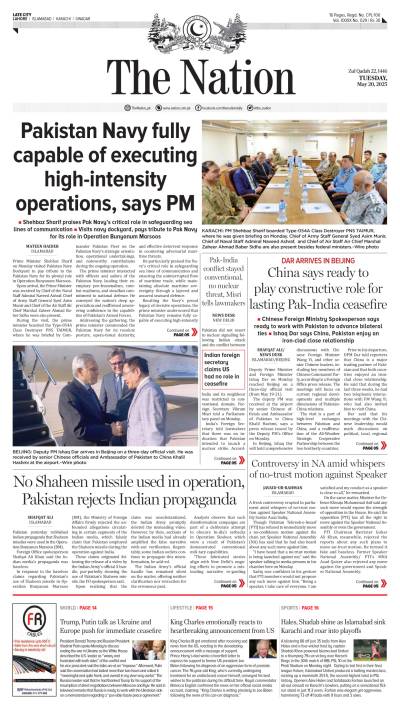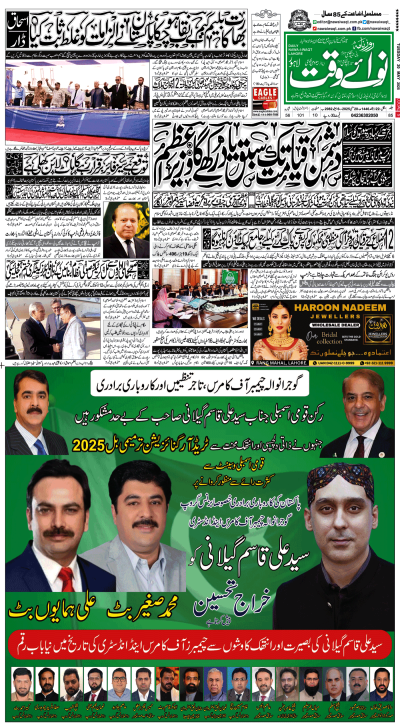LAHORE - In a landmark move aimed at accelerating urban development and anti-encroachment efforts, Punjab Chief Minister Maryam Nawaz Sharif on Monday presided over an intensive six-hour special meeting as she personally reviewed and approved the annual development plans of 12 districts, a first in the province’s history. All divisional commissioners and deputy commissioners from across Punjab were in attendance as the chief minister assessed progress on district development, anti-encroachment operations, and urban beautification efforts. The meeting will continue on Tuesday (May 20) as well focusing on the remaining districts. Terming cleanliness and encroachment elimination a “major challenge,” Maryam Nawaz emphasized that district administrations have been granted full autonomy to act without external interference. “No one is allowed to influence their decisions,” she said, adding that elected representatives themselves have acknowledged visible improvements across sectors in their constituencies. “Our competition is not with previous governments, but with our own performance benchmarks,” she remarked. “Although overall progress is satisfactory, there is still much more to be done. The true measure of success is the relief felt by the people — and time is not on our side.” She voiced serious concerns over corruption within departments, stating, “Corruption, especially in my presence, is unacceptable. A comprehensive crackdown must be launched to root it out once and for all.”
Among the wide-ranging directives issued, the chief minister approved model rickshaw stands in every city, CCTV surveillance of government land reclaimed from encroachments, urban forests and sports areas on recovered land, daily monitoring by field officers to prevent the return of temporary encroachments, relocation of grain, fruit, and vegetable markets outside urban centers along with uniform development standards, solar street lights, uniform lighting themes, planters, and tree-lined roads to elevate urban aesthetics, removal of electric poles obstructing roads, and construction of tuff tile footpaths.
Also, the chief minister approved a series of development, beautification, and anti-encroachment projects across several cities as part of a broader initiative to modernize urban infrastructure and reclaim public spaces.
In Faisalabad, the chief minister directed the provision of additional electric vehicles for public use and ordered infrastructure upgrades in every market surrounding the historic Ghanta Ghar. The meeting also reviewed the successful removal of encroachments in key areas, including Sargodha’s Gol Chowk.
The chief minister gave the green light to the urban uplift plan for Rawalpindi’s iconic Raja Bazaar. It was also decided that historical buildings in Rawalpindi will be restored in collaboration with the Walled City Authority, aiming to preserve the city’s cultural heritage.
In Sahiwal, officials informed the chief minister that 85 percent of encroachments have been removed, and monitoring efforts continue. Uplift plans were approved for Saddar Bazaar and Pakpattan Bazaar, while the relocation of Sahiwal’s General Bus Stand was also sanctioned.
Multan will see major development work, including the restoration of the 278-year-old Wali Muhammad Mosque and the upgrade of Sher Shah Interchange and Liaquatabad Road. The CM approved the construction of 22 new bus stops and reviewed the progress of the 9-kilometer-long Multan Avenue project along the Northern Bypass. She also directed the swift completion of the Chowk Ghanta Ghar expansion and restoration.
In Sialkot, 1,089 encroachments have been removed, and plans are underway for the restoration and construction of the Sialkot Fort and Iqbal Manzil over 17 kanals of land. The construction of Baab-e-Sialkot was also approved.
For Dera Ghazi Khan, the chief minister approved the construction and widening of Shah Sikandar Road, early completion of a major sports area, and the provision of four electric carts to support public mobility. In Bahawalpur, she sanctioned development work for Fareed Gate, a new food street, and the restoration of the 200-year-old Al-Sadiq Mosque, along with the construction of a connecting road and beautification of Satellite Town and Model Town.
In Rahim Yar Khan, internal market renovations were approved, including the installation of fiberglass roofing, mist fans, and water coolers. The Chief Minister also ordered the development of a new food street in Gujranwala, modeled after Lahore’s popular culinary zones.
Briefings during the meeting revealed that 6,416 kanals of government land worth Rs. 9.2 billion were reclaimed in Faisalabad. In Gujranwala, 116 markets and roads were cleared of 6,566 permanent encroachments. The city administration aims to fully clear illegal structures and cattle pens, with plans to convert a major waste dumping site along GT Road into a green area.
The chief minister underscored the urgency of completing all uplift and anti-encroachment projects on time. She stressed that these initiatives are not just about aesthetics but about reclaiming public spaces and ensuring long-term urban sustainability.






